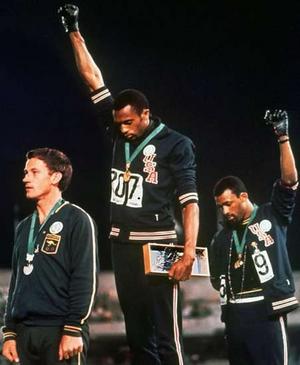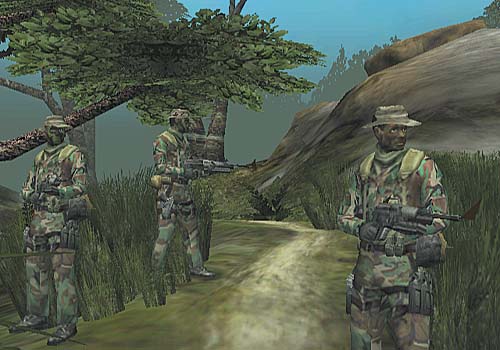This post has not been edited by the GamesBeat staff. Opinions by GamesBeat community writers do not necessarily reflect those of the staff.
As typical, I spent a good portion of the week listening, if not watching, Colin Cowherd's ESPN Radio show The Herd. I'm pretty fond of Cowherd as generally attempts to bring a perspective to sports that doesn't treat sports as if there's not a world going on outside of the sports world. It's much of the reason I enjoy Stephen A. Smith even if one of my best friends that found his giving the sports world a context within the bigger picture of the world instead of allowing it to just be an escape. It's something I often wish I saw more in games journalism without the prodding of controversy.
 This difference between myself and the friend in the sports context is totally understandable and it comes to history and culture. Sports, amongst other fields of entertainment, was often in the past one of the spheres my people had to make statements against social injustice. Jackie Robinson in the struggle to integrate baseball, Muhammad Ali in refusing to fight in war he didn't support, Tommie Smith and John Carlos lowering their heads and raising the Black Power fist on the podium during the national anthem at the 1968 Olympics were all heroes to many in the culture not just for their athletic feats but for the courage and defiance.
This difference between myself and the friend in the sports context is totally understandable and it comes to history and culture. Sports, amongst other fields of entertainment, was often in the past one of the spheres my people had to make statements against social injustice. Jackie Robinson in the struggle to integrate baseball, Muhammad Ali in refusing to fight in war he didn't support, Tommie Smith and John Carlos lowering their heads and raising the Black Power fist on the podium during the national anthem at the 1968 Olympics were all heroes to many in the culture not just for their athletic feats but for the courage and defiance.
Getting back to Uncle Colin, a name Cowherd uses when he feels he's teaching life lessons, The Herd's host was critical of Lebron James for what he considers "dude worship" of Michael Jordan. Essentially he contends NBA players, many of which never went through what he considering the maturation and identity building process of college, spend too much time idolizing Michael Jordan and not enough time building their own brands and identities.
While I think my dear Uncle Colin completely missed the point of what Jordan symbolized to Lebron and really his entire generation (i.e. opening the door for the Lebrons and Kobes to be their own brands), I did begin to think more and more about what makes a hero to people. In particular what makes a hero in games and one that stands out for being more than just the avatar carrying out a mechanic.
The Soldier
Being not too far removed physically from the Ft. Hood massacres only days before the release of Modern Warfare 2, the first placed I turned to was the military shooter. Where there's a certain ridiculousness to the sci-fi shooter, there's a certain gravity in a well-done military shooter that may never reflect the full experience — I'm not even sure I'd really want that experience — it does give an idea of the sacrifice, the skill, the scope and the loss a solder faces in war.
For instance, let's look at the much-maligned Boomer in the series SOCOM series. Putting aside a segment of the SOCOM audience's frustration with his AI and the subsequent probable out-of-game satirical context, Boomer accompanies the player throughout the first game. He then is wounded in friendly fire in SOCOM 2. The next time he's seen in the series in Combined Assault he's dead at the hand of terrorist after having his chopper shot down. Such calamity is pretty funny in the over-the-top Gears of War formula. The well-publicized friendly-fire death of Pat Tillman and it's cover-up amongst the many other deaths for some may sober the comedy other's may find.

Taking a look Call of Duty 4: Modern Warfare, one can imagine not just the stresses of being Nikolai or Allen working as an informant, but what might have happened in the period of time to Nikolai between having his cover compromised and being rescued. Or being amongst the USMC forces that failed to evacuate a city before a bomb, in this case a nuke, goes off taking the lives of many, including soldier you might have known. Or being Soap or Price, already wounded watching the execution of your squad-mates.
A recent study released last week by the U.S. Army Mental Health Advisory Team found 24.1 percent of soldiers in Afghanistan showing signs of post-traumatic stress, depression and anxiety. This isn't counting soldiers that have come back home attempting to adjust to civilian which often isn't a easy transition.
We're in a time where this information is readily available to all in the United States in making a decision whether to join the military. The very realistic possibility of death if not permanent injury and long-term mental trauma stand before every person making that decision.
Many still accept that calling.
For the gamer, every headshot has a respawn. Any bout of frustration can be met by powering off the game and coming back later. On the field, there are no respawns, no resets, no perks. There are often difficult moral choices that a FAQ can't tell you the predetermined consequences and rewards.

Most of us, frankly, don't have the courage to sign up for a war not on a DVD, Blu-Ray or digital download. I certainly haven't been in a rush. And for me, all political and moral arguments for or against any particular war or war in general notwithstanding, that seems to make soldiers part of the stand out heroes in gaming.
Gerren LaQuint Fisher is the last action-rpg hero. He also contributes to The Game Reviews, tweets @gerrenlaquint, and runs an villianous blog called The Underscore
